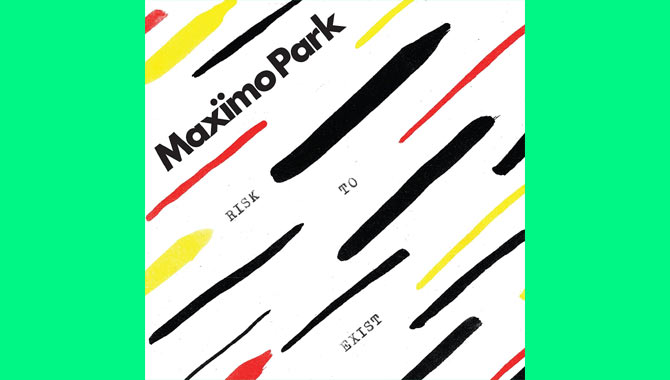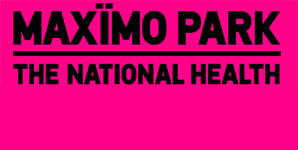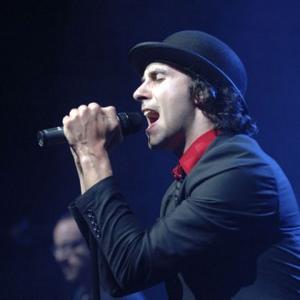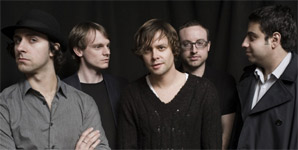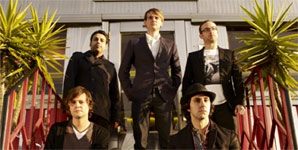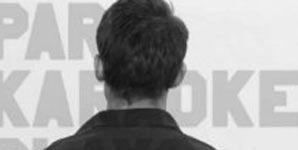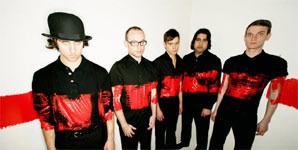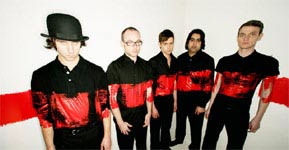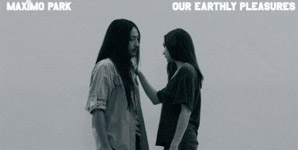
Maximo Park, Interview
14 June 2012Interview with Maximo Park
With The National Health indie rockers Maximo Park combine equal parts social angst with the hearty doses of romance and everyday commentary in what is very much the bands most true to life foray away from the cliche ridden world of daytime Radio 1 friendly guitar music. The latest album has so far been warmly received by the press and if this, along with the speed in which tickets for their upcoming shows went, is anything to go by then anyone doubting whether the band are still relevant should be replied to with a firm no.
We managed to catch up with frontman Paul Smith to discuss the writing process and his own opinions on the album and just how far he and the band have come since they first emerged on the scene all those years ago.
You've said that the album is like "the greatest hits collection we never had." - What exactly do you mean by this?
Well, it feels like the record pulls from all the different parts of our musical history and adds a few extra ingredients into the mix. It feels like a new strength has come into the band; it does feel like, in our minds, that the songs could've been played on the radio or something and they feel very upbeat and catchy and very much connected to the original ethos of the band which we etched into our very first 7 inch 'popular music that isn't popular yet' which is something that we always had a yearning for - to connect with people and to have songs with great tunes and lyrics that people could relate to that were somehow different from the norm. So, yeah, I guess that goes some way to explaining that course.
There are certain tracks where, lyrically, they seem to have much more social angst than usual; is this album a call to arms for some of your listeners?
I suppose so. It feels like a very varied record and when we came to titling it we knew that 'The National Health' would grab people's attention and maybe focus them on things that you don't usually expect of Maximo Park; things that I think were always there from early songs like 'Kiss You Better' where it kind of says everyone should have a choice. A lot of our songs have been about personal empowerment and finding a way out of somewhere. Some of our earlier songs were finding a way out of a small town and going to a big city and stuff like, 'Our Velocity' touched on the wars that Britain was engaged in at the time. It feels like: okay, the last album, we kind of made quite an insular record in a way; it was very much about affairs of the heart hence it's title 'Quicken the Heart' and it felt like it discussed a lot of racy subjects [Laughs] that maybe hadn't covered fully up to that point.
Having got that out of our system, when we were trying to reassess how things were gonna go, a lot of the lyrics, we realised, had mentions of more social situations. The lyrics on 'Waves of Fear' are 'You and I will overthrow these waves of fear, these tides of war; you and I will overcome the apathetics we've become' - it's about hauling yourself out of something and finding a way through.
Do you see the album as more of a personal album rather than a political concept album?
Yeah, definitely. I think some people are really good at writing angry political songs and there's a lot of people who aren't and seem to write them anyway, telling people how to think and what to do and that's a depressing thought for me as a musician. When we go out and play our shows, I want people to enjoy themselves whether they're dancing or paying attention to the lyrics; think about the situation and think about what's happening and think, 'I feel alive now'. That's the way I want people to feel and it's the way that I feel when I go to concerts. I think, from day one, the things I've found easy to write about as a lyricist are things that are really close to me. I remember reading a Leonard Cohen interview recently where he was saying: 'How can I write about something that I don't know about? It would be false and impossible' and I think something very similar really.
There are songs on the record like 'Banlieue' which is essentially about fear. It takes its route out of a story that I'd read about the French suburbs - the Banlieues are the ghettos of France now, specifically on the outskirts of Paris - when we were touring in France. On a day off, I'd seen behaviour that correlated with the things that I'd read and it inspired me to write a song that was very much based in my own experience of that kind of behaviour. It's definitely routed in the everyday excitements and struggles and happiness and sadness that you have as you go about your life.
You often speak about love in a lot of your lyrics, being in love and falling in love; do you like to see yourself as a bit of a romantic?
I don't see myself as anything, to be honest. I just exist [Laughs] which is kind of a strange thing to say. I would say that I am a romantic person but I think, again, you've got to try and be honest in your songs and reflect what interests you instead of being too much of a self-styled romantic person or self-styled lothario or a self-styled political agitator. The romanticism that goes through the music, I guess it's a yearning for something more and yet we'll never get to that other place where you will be fully satisfied. You'll always be searching for something and I think that yearning has got to be in a good song whether it's yearning for a good time on the beach with The Beach Boys or yearning for a new love after you've had your heart broken. For me, it's all bound up in honesty and saying something about yourself and hoping that it will resonate with other people.
You were apart for some time; did you feel that much had changed when you went back into the studio?
I think a little bit, I mean, it didn't manifest itself as some sort of seismic split. It felt like some days would be good in the studio and some days would be a bit awkward and kind of like, 'This song's not quite working'. In the end we made sure that we talked about things a lot more.
We started in, I think, 2003 and we were all living in very close quarters to each other and sharing ideas and sharing dreams of what the band might be. The life that we were living was great and it's really good to get about and play songs but I think you've also got to have time to figure out what you wanna write about and live your life and gain new experiences that go along with the ones you've experienced on tour.
So, after all of these things, I think having a break was good for us but there was just a little shift in opinions of where we wanted to go. Some days I would wanna make a concept album [Laughs] lyrically, and then other days I'd wanna write a pure pop song that wasn't connected to anything. In the end we pooled all of our ideas together and decided that we definitely enjoyed writing direct, catchy, upbeat yet somehow complex pop songs. It came back to the core ideals of the band.
Did your time apart influence your decision to work with Gil Norton again?
It was a good way of getting us all back together, in a way, in the studio. Even though we had all of the songs written, when we got him involved we didn't really know how they would sound. We'd written a couple of songs, 'Reluctant Love' and 'Write This Down', and we thought, 'Let's try these out with Gil because they feel very Gil' for whatever reason. They felt like he could do a job on them because 'Reluctant Love' was quite tender and quiet but we still wanted it to be upbeat and fast and sort of bouncy - that sounds like a very dad word to use - but, anyway, we thought, 'Well, Gil's good at keeping the tenderness intact but also injecting a rock element to things, something that's a bit harder, so let's give him a go with that one and write this down again'. We went to record with him in Wales, did those two songs and we had such a great time that it just made perfect sense to ask him to do the rest of the album. It was good because he's a perfectionist and a kind of arranger; he'll go, 'Ooh, I'm not sure about that transition between the bridge and the chorus' and he'll just say 'Play it a couple of times and see what you come up with' and that's really helpful because sometimes the five of us all have quite different opinions about where the songs should go.
Moving on to the video for your latest single; how did you end up working with Thomas Turgoose?
Well, I'm a big fan of Shane Meadows' films and Thomas Turgoose was in a couple of those. We'd heard that he was a fan of the band and we were wanting to do something where we weren't in it but something that would get people's attention and we approached this video director and said 'Look, Thomas is happy to appear in a video of ours, what can we do to put a spin on it so that it's not just a famous actor in the video?' and the director came up with the idea of having a fan in a room doing a webcam sort of thing and making it a bit darker. It was quite funny just having that Alan Partridge element to it where it's just like this mental guy in a room and I'm stuck in the cupboard. It was a good opportunity to have some fun and fit in with the song, just calling a song 'Hips and Lips'. the imagery in it is meant to be semi-ridiculous; the kind of ridiculousness of being in an argument and sticking your hips out at somebody and going 'Ner ner ner!' [Laughs] so it was like let's focus on that side of it and, yeah, I think we pulled it off.
The tickets for your upcoming tour sold out almost straight away - how reassuring is it to know that you still have such a loyal fan-base?
It's amazing! It amazes us every time it happens and it gives you a confidence. Last night when we went on stage in Birmingham at The Glee Club, you know that it's sold-out in five minutes, you know that people who are there really want to see you and they obviously believe in the band and, with the new album, they know you're gonna play new songs. To have a great reaction and to know the tours are selling well, it's a real boost. I'd like to think that every time we go out we give a hundred per cent, I've never given anything less than my best at any show and long may that continue. The songs are very passionate and if you like our band, then you obviously like the verve that's in the songs and, live, you can see how much it means to us so I think it's a very big part of what we do.
Do you really feel that "guitar bands are dying out"?
Absolutely not! The thing is, music will always be there. Music is a big part of my life, a big part of everybody's life and, the problem is, when something becomes chart friendly and popular, like, guitar music, you're always gonna get loads of really bad versions of the good stuff. Whatever's reigning at the top of the charts; there's gonna be a certain amount of rubbish that's trying to get on the bandwagon. I don't really listen to much guitar music but when I do, I love it as much as anything. For me, it's about melody and about words and about arrangements and when you hear something that's good, I just don't think people should be thinking about what kind of music it is. They should just go, 'Do I like this or not?' and I certainly hope that people listen to our new album and don't think, 'Ooh, is this a guitar band? Is this a Northern band?' All those tags don't really make much difference to me; it's like, 'Do you like it? Will you give it a good listen?' I'm glad that a lot of bands have just been cold [Laughs] because that's the way it should be - you've got to sort the wheat from the chaff.
In the future, will there still be the rockier, poppier elements of past records on show or can you see yourself descending further into electronic music?
Well, it's hard to say. We've always had Lukas in the band doing stuff like 'Limassol', where there's a really pulsating keyboard riff all the way through, and stuff like 'Hips and Lips', off the latest album, has a techno rhythm to it. We always try different things on each record but, at the core of it, I think what we're good at is alternative pop; something that exists to last for three minutes and to try and mean something in that time and, however hard that might be to pull off, that's our aim really. I don't really know how we'll do it and I'm sure we'll all make records on our own that are quite different from Maximo Park and that follow different avenues that we're interested in. We will always progress and evolve but within the template.
What were you listening when you were making the album?
Basically, I buy two or three records a week and [Laughs] I can't really say! We were listening to all sorts of things and it goes from older music to newer things. Me and Dunc were listening to a lot of Real Estate and Kurt Vile; it's the really interesting ways to make guitars sound good - acoustic guitars that sound a bit psychedelic and yet they don't interrupt the song. I think there are atmospheric moments on stuff like 'The Undercurrents' or 'Unfamiliar Places' where you can hear that we've been listening to stuff like that. It's very melodic music; I think that's what I'm drawn to and it nods back to things that I love like Felt and The Go-Betweens - really timeless music that just relies on the melody and guitar melodies that are just beautiful and picked. It's really hard to pin down because the five of us were listening to loads and loads of different things over the course of time. You can be influenced by a book, like I was reading this Russian book called 'We' by a guy called Zamutin and reading poems by people like Lavinia Greenlaw. I think you've just got to be inspired by all sorts of different things and try not to have any boundaries in what you listen to and it'll all come in there somehow whether it's a lyric or a drum pattern and stuff like that. Things just crop up in our songs.
Joe WIlde
Official Site - http://maximopark.com
Contactmusic
Top 10 Videos
Wallace Chung
XXX
1
10 Years
Beautiful
2
Fast Girls
Fast Girls
3
Shaggy
Hey Sexy Lady
4
Air
Sexy Boy
5
The Staves
Tired As F***
6
Robin Thicke
Blurred Lines (Unrated Version)
7
All That Remains
Six (Live)
8
Fugees
Boof Baf
9
Fleur East
Sax [Live]
10

